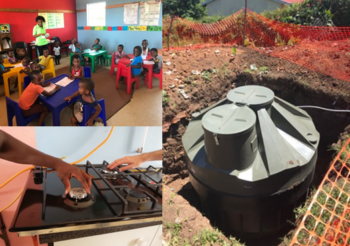New publication: Decentralised Micro-biodigester systems for rural South Africa
This is the third of a case study compilation to explore lessons on material and energy valorisation of waste within the framework of IEA Bioenergy Task 36. The central technology in this case study is micro-biodigesters systems applied in rural areas in South Africa.).
South Africa’s rural areas have been historically characterised by persistent service delivery challenges, including lack of waste management services, poor access to reliable sanitation systems, inconsistent and unaffordable energy options. Although the viability of biogas systems as decentralised waste management, sanitation, and energy solutions for rural areas within the Global South has been well documented within contemporary literature, biogas interventions within South Africa have not been successful for a variety of reasons, namely, limited research and implementation, despite a readily abundant supply of suitable feedstock within rural contexts.
The purpose of this report is to contribute to the development of a best practice model for rural biogas provision in South Africa. It is contextualised within two interrelated, but distinct, rural bioenergy projects located in the Ndwedwe Local Municipality (NLM), within the iLembe District Municipality in the KwaZulu-Natal Province, funded by the South African National Energy Development Institute (SANEDI) and the National Lotteries Commission (NLC). These two projects encompassed repairs to 26 existing household digesters and design and implementation of new integrated biogas provision and sanitation systems at five Early Childhood Development Centres (ECDCs). Utilising a mixed-methodological approach, interventions were evaluated on their socio-economic, energy, and sanitation outcomes, and an optimisation plan was implemented to address identified shortcomings.
Link to the publication below: Task 36 case study Biodigesters South Africa



